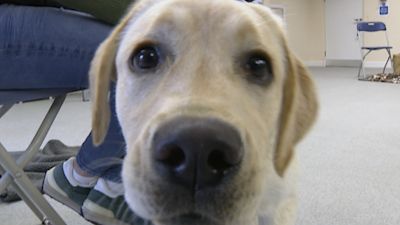Volunteers needed to help train puppies to become assistance dogs

WATCH: ITV Meridian's Mel Bloor meets Dogs for Good's latest recruits.
A charity which provides people with disabilities with assistance dogs is on the lookout for volunteers to help prepare their puppies for training.
Banbury-based Dogs for Good, says the pandemic has had a big impact on the number of puppy socialisers coming forward and it's now urgently seeking more.
Volunteers take on the puppies at around eight weeks old and have them until they are 12 to 14 months.
The charity provides ongoing support during that time and training in the form of regular classes.
Dogs for Good provides trained assistance dogs to people with physical disabilities and families who have a child with autism.
It also supports learning disabled people and those with dementia to help them lead a more independent life through the help of a trained dog.
Helen Townsend, a puppy coordinator at Dogs for Good, said: "The pandemic has had a real knock on effect on the amount of volunteers we have.
"We've still maintained face to face contact with our socialisers but obviously in the early days we were meeting outside and we couldn't go in environments like shops and things.
"To do home interviews, we couldn't go in to people's homes so people who did apply during the pandemic to become a socialiser we had to do their interviews over Zoom."
WATCH: Puppy coordinator Helen Townsend is responsible for supporting the socialisers
Chris Muldoon, Operations Manager at Dogs for Good said: "The demand for our services is incredibly high, but in order for us to support more people, we need to start with supporting our pups through the first year of their lives.
"Having a puppy gets you out for a walk every day and can break the ice when you meet people and create a talking point. Many socialisers say they feel fitter and healthier and they've met lots of people and made new friends."And when it comes time to let the puppy go onto the next chapter of its life, Chris said: "Often people discount this role because they feel that they couldn't give the puppy back once their job is done.
"And for sure, it's super-hard to say goodbye. But our socialisers who have done this many times say that while it's never something they look forward to, they also experience immense pride when they see how the part they have played in that puppy's life has made a life-changing difference to someone with a disability."Most expenses are covered by the charity including food, health insurance and vet bills. Although no experience is necessary, puppy socialisers are required to meet the following criteria:
Have a fully-fenced safe and secure garden
Be away from the puppy for no more than two hours (in the first few weeks) and four hours (for the remaining time you have the puppy) per day
You have no more than two pet dogs in the home
Drive or have access to someone at all times who can drive you and the puppy
With the support of our puppy department you will be willing to train the puppy in the basics, i.e. house training, general obedience and walking on the lead
Be able to spend some time every day on activities to meet the health and welfare needs of and socialise the puppy. Guidance will be given and environments that need to be covered at some stage include shops, cafes, train stations, buses, crowded and rural areas
Be able to attend monthly puppy classes and group visits and allow home visits from a member of our puppy training team
Provide the puppy with regular contact with children, other dogs and cats
For more information on Dogs for Good, visit their website.